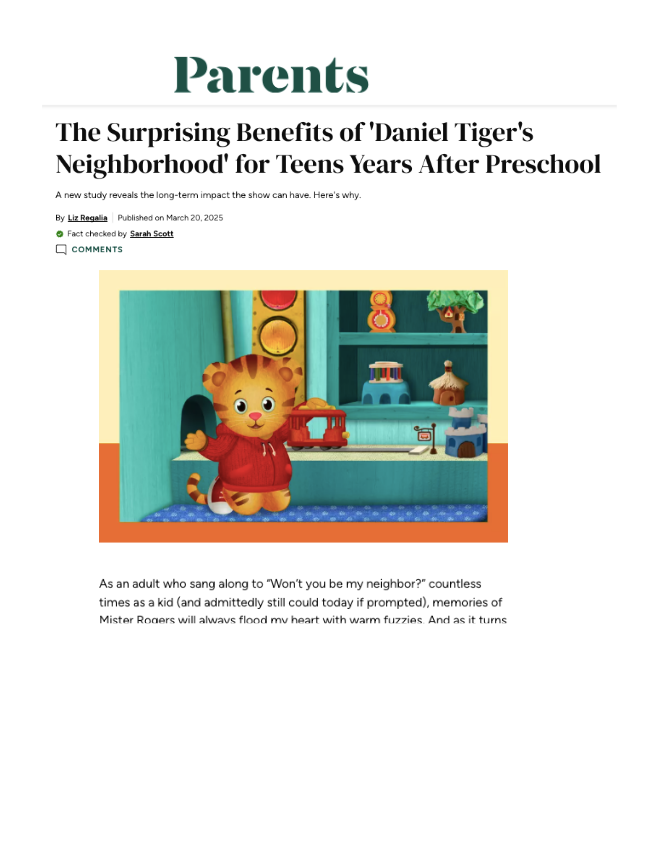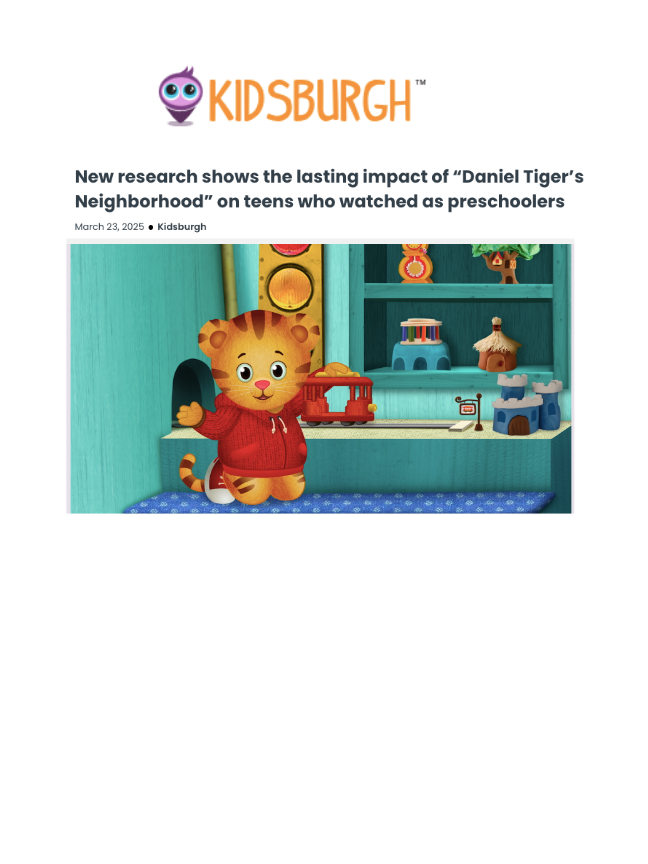
Commissioned Research
“Ugga Mugga” — Teens recall lessons learned from Daniel Tiger’s Neighborhood
in the news
in the news
Key Takeaways
Nearly 12 years since its debut, teens remember Daniel Tiger’s Neighborhood as a show that taught them social-emotional and life skills. These kinds of skills consistently predict children’s success in school and community.
Teens remember the show fondly for inspiring feelings of comfort, companionship, and happiness as young children. Nostalgia remains an important component of how they feel about the show.
Teens want to see storylines around important topics such as bullying, kindness, and friendship, but don’t feel that content is available to them in entertainment choices aimed at teen audiences today.
Daniel Tiger’s Neighborhood, inspired by the beloved puppet character from the pioneering television classic Mister Rogers' Neighborhood, debuted on PBS KIDS in 2012. From its inception, the producers collaborated with developmental psychologists and early learning experts to ensure the show taught preschoolers essential life skills such as empathy. The animated series built upon Fred Rogers' legacy of social and emotional education, using music, creativity, and imagination. This thoughtful approach proved successful, as Daniel Tiger’s Neighborhood has maintained its popularity, both with parents and children, for more than a decade. The series has garnered numerous awards and expanded beyond television to include live performances and even theme park attractions.
To assess the long-term impact on the young audiences who watched Daniel Tiger’s Neighborhood many years ago, Fred Rogers Productions asked UCLA's Center for Scholars & Storytellers (CSS) to independently conduct a mixed methods study, surveying 150 teenagers ages 13-16 who were toddlers when the show premiered. The study participants represented diverse gender and racial/ethnic backgrounds, with demographics matching U.S. census data proportions.
How Daniel Tiger’s Neighborhood Taught Social-Emotional Learning Skills
The most memorable lessons were probably like the ones about like different emotions like sadness, anger, frustration, happiness, different ways you can deal with like sadness and anger… that's really what I like took away from those lessons, like ways to deal with stuff like that.
— White Female, 14 years old (Pennsylvania)
The study revealed that teenagers who watched Daniel Tiger's Neighborhood as young children retained significant memories of the show's lessons about social-emotional and life skills. Nearly three quarters of the participants remembered learning how to understand others' emotions, maintain friendships, manage their emotions, and develop problem-solving skills.
Even after many years, participants could remember specific ways to handle tough emotions and situations as modeled in the show. For example, teens recalled using strategies like using deep breathing when they were upset, with 21% specifically mentioning that that they still use these calming techniques they learned from the show today. The show's songs made a lasting impression too, and they could still sing and use the helpful messages years later.
Importantly, 57% of teens said their most memorable lessons from Daniel Tiger’s Neighborhood were about understanding and managing emotions. This skill is related to better mental health, academic success, and behavioral regulation. Daniel Tiger’s Neighborhood taught kids emotional skills that stuck with them as they grew up. It wasn't just entertainment — it gave them tools they could use well into their teenage years.
Characters, Songs and Themes Have Had a Lasting Impact
An overwhelming 71% of participants remembered feeling happy when they watched Daniel Tiger's Neighborhood as young children, with many describing a deep emotional connection to the show and its characters. The research revealed that teens vividly recalled feeling safe, comforted, and connected while watching. In a time when adolescents report feeling safe as one of their top life goals, this finding provides evidence that media can provide solace.
As one 14-year-old male participant from Kansas shared, "I felt like I had my own friend every time I watched it," while a 15-year-old female from Louisiana expressed, "Like I was part of his world. I got to hang out with him."
The study found that 93% of participants co-viewed the show with others, suggesting that Daniel Tiger's Neighborhood created opportunities for shared emotional experiences with family members. This connection is highlighted in several teen responses, including a touching memory from a 15-year-old Hispanic female from California who recalled, "I remember Daniel used to say Ugga Mugga and I know that was like their way of saying I love you. So after like every episode I used to hug my grandparents or like my mom or dad." The show seems to have facilitated meaningful moments of family bonding that teens still remember fondly.
Many teens expressed nostalgia when thinking about the show, with some noting how it reminded them of simpler times. As one 13-year-old White male from Pennsylvania put it, "It was a nice warm fuzzy feeling." This sentiment was echoed by other teens, including a 15-year-old non-binary, biracial participant from Wisconsin who reflected, "It took me back to when life was easy.
Teenage years are hard. So many changes and experiences." These responses suggest that the show not only provided comfort in childhood, but that it also continues to serve as a positive emotional touchstone into their teenage years.
How This Impacts What Teens are Watching Now and What They Want to See
When asked about their current viewing habits, only 35.3% of participants said they were watching anything that taught them life or social-emotional skills. Even more tellingly, those who did find shows with similar themes reported that these current programs taught them fewer skills than Daniel Tiger's Neighborhood did when they were younger.
This research shows there's a clear hunger for this type of content; when asked if they would watch shows about the topics they suggested, an impressive 77.3% said yes.
The content gap becomes even more apparent when looking at what teens are currently watching. Of the 57 titles that participants said teach them life or social-emotional skills, over 60% are actually rated for children 12 and under. Prior CSS research found that teen programming often lacks content that modeled positive character strengths and life skills. This highlights a clear need for age-appropriate shows that address adolescent social and emotional challenges.
A White Space for Creators and Why It Matters
As teenagers navigate increasingly complex social situations and emotional experiences, the research indicates there's a significant opportunity to create content that speaks to their specific needs and developmental stage. With teens reporting more anxiety and with their top goal being safety, this kind of programming can not only bring them comfort, but also support building community and family bonding. CSS research of over 1,000 films found that movies that featured more positive character strengths made $50 million more at the box office in the global marketplace than those that didn’t portray these strengths.
This research along with the lasting impact of Daniel Tiger’s Neighborhood, demonstrate an audience hungry for content that feeds their emotional needs and reveals a significant opportunity in the entertainment landscape.
As teens continue to seek content that addresses their emotional needs and provides tools for navigating life's challenges, there's both a clear market demand and societal benefit for creating age-appropriate programming that carries forward the legacy of shows like Daniel Tiger's Neighborhood.
*Scroll below for details on this study’s methodology and limitations
Authors
-

Elly Pueschel, PhD
Senior Researcher
Dr. Elly Pueschel is a Senior Researcher at CSS. She earned her PhD in developmental psychology from the University of Southern California, and she is passionate about translating science to inform content made for children and teens. Across her work, her goal is to use her expertise in child development and mixed-methods research to empower creators and parents with the tools to leverage media to support children and teens’ positive development.
-

Alisha J. Hines, PhD
Research Director
As director of research, Dr. Alisha J. Hines leads the research team and oversees all studies conducted at the Center for Scholars & Storytellers at UCLA. She earned her PhD in History & African American Studies from Duke University and is a former faculty member of Wake Forest University's History Department.
-

Yalda T. Uhls, MBA, PhD
Founder and CEO
Founder and CEO of the Center for Scholars & Storytellers, Dr. Yalda T. Uhls is an internationally recognized, award-winning research scientist, educator, and author, who specializes in studying how media affects young people. She received her MBA and PhD in developmental psychology from UCLA, is a former movie executive at companies like MGM and Sony, and is a proud Gen Z parent.
Acknowledgments
We would like to thank our collaborators from Fred Rogers Productions, Ellen Doherty and Gabrielle Howard, for their thought partnership in this study. We also appreciate Dr. Toyo Aboderin, Matt Puretz, Atlas Burrus, and Grace Bui-Luu for their support with data analysis.
Methodology
-
The research team created a mixed-methods survey incorporating both quantitative and qualitative questions to explore the long-term impact of the Daniel Tiger's Neighborhood television series. The survey aimed to: (1) evaluate what lessons and skills teens remembered learning from the show as children, (2) capture their emotional experiences while watching the show as young children, and (3) understand what they are currently watching and what content they would like to see. The questions explored topics ranging from favorite characters and memorable stories to specific skills learned and emotional connections formed.
-
The study included 150 adolescents ages 13-16 years who had watched Daniel Tiger's Neighborhood as young children. The sample was deliberately recruited to represent diverse gender and racial/ethnic identities, with demographics proportionate to U.S. census data. The participant breakdown included:
Age distribution: 33.3% were 13 years old, 28.7% were 14 years old, 25.3% were 15 years old, and 12.7% were 16 years old
Gender: 51.3% female, 47.3% male, 0.7% non-binary, and 0.7% transgender
Race/Ethnicity: 67.3% White, 17.3% Black, 6% Asian, 6% Hispanic/Latinx, and 3.3% More than one race
-
Data collection occurred between December 2023 and January 2024. The survey was administered online by the panel company Knit.
-
This study had a few limitations. First, it relied on participants' recall and self-reports of their early television viewing habits, which may have led to inaccuracies in the reported age of first viewing Daniel Tiger's Neighborhood and the number of years of viewing. Second, while we aimed to recruit a nationally representative sample, many participants were from California and Texas. Third, since the survey was conducted online without direct interaction between the researchers and participants, we were unable to probe responses, sometimes resulting in brief or one-word answers to open-ended questions. Lastly, this commissioned research has not undergone peer review, and its findings are specific to the studied sample.












